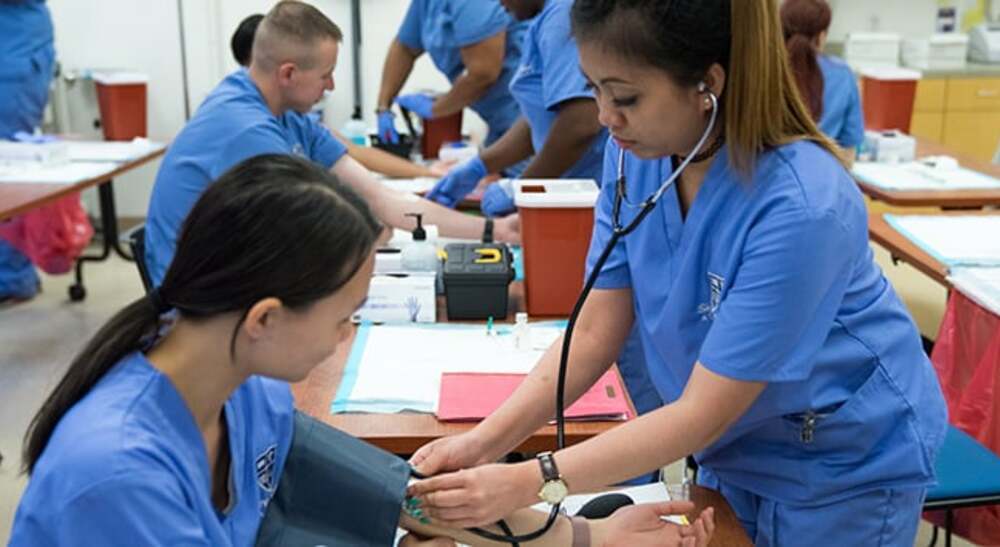Expert Northeast Medical Institute Phlebotomy Classes Stamford: Get Licensed
Expert Northeast Medical Institute Phlebotomy Classes Stamford: Get Licensed
Blog Article
Essential Factors to Think About When Picking the Most Appropriate Medical School Educational Program for You
Choosing the most suitable clinical school educational program is a critical decision that can substantially influence your instructional journey and future profession course. As striving doctor, the selection of curriculum should straighten with your personal discovering design and job goals. However, beyond these initial factors to consider, numerous critical variables enter play when making this option. By discovering the subtleties of training approaches, educational program flexibility, and scientific exposure possibilities, a more comprehensive understanding of what makes a curriculum suitable for you emerges. Let's check out these critical aspects that can form your medical education and learning and ultimately, your specialist trajectory.
Personal Learning Style

Medical schools that offer varied teaching methods and resources can fit different learning designs, fostering a dynamic and inclusive instructional setting. Inevitably, understanding personal knowing preferences encourages trainees to make enlightened choices concerning their clinical education and learning, setting a solid foundation for their future occupations in health care.
Occupation Purposes Positioning

Moreover, straightening occupation purposes with the clinical institution educational program can additionally boost inspiration and involvement throughout the instructional journey. When trainees see the straight relevance of their coursework to their future career, they are more probable to remain focused and specialized to their research studies. For that reason, when selecting a clinical institution curriculum, it is crucial to meticulously take into consideration exactly how well it lines up with one's job goals to guarantee a successful and satisfying expert path.
Mentor Approaches
Thinking about the positioning of career goals with the chosen clinical college educational program, an assessment of the teaching methodologies utilized becomes important in shaping the discovering experience. The effectiveness of a clinical institution curriculum heavily counts on the teaching methodologies made use of by the organization. Numerous teaching methods, such as lectures, tiny group discussions, problem-based learning, simulation-based training, and hands-on scientific experience, can dramatically affect just how well pupils keep and understand information.
Lectures are a typical but still commonly utilized approach for delivering material to a big team of students efficiently. Tiny group discussions foster collaboration, essential thinking, and interaction skills amongst trainees. Problem-based discovering urges energetic engagement, self-directed learning, and analytical abilities. Simulation-based training allows trainees to exercise scientific abilities in a controlled setting prior to communicating with real clients. Hands-on professional experience offers a firsthand understanding of person care and medical practices.
When selecting a medical school educational program, aspiring trainees ought to think about the teaching approaches utilized to make sure that their understanding preferences and strengths align with the instructional technique have a peek at this website of the establishment.
Curriculum Versatility
When examining medical institution programs, assessing the degree of educational program versatility is vital for possible students looking for a customized educational experience. Curriculum flexibility refers to the degree to which trainees can customize their understanding courses within the clinical bachelor of graphic design college educational program. An educational program that supplies adaptability enables students to pursue their passions, emphasis on areas where they require much more assistance, and participate in learning experiences that line up with their career goals.

Potential medical trainees should think about how a clinical college's curriculum adaptability aligns with their learning preferences, occupation desires, and individual goals. By picking a program that offers the best balance of structure and versatility, pupils can enhance their educational experience and prepare themselves for effective careers in medication.
Clinical Exposure Opportunities
Exploring the useful application of clinical understanding, professional exposure opportunities play a critical duty in shaping a comprehensive clinical education. These chances supply trainees with very useful hands-on experience in real medical care setups, enabling them to bridge the void in between theory and method. When considering clinical school educational program, the top quality and quantity of professional exposure must be meticulously examined.
Reliable professional exposure must use a varied variety of experiences across numerous specializeds, guaranteeing that pupils are exposed to different medical scenarios and link individual demographics. Direct exposure to outpatient facilities, inpatient wards, medical theaters, and emergency divisions can help pupils develop a well-shaped understanding of different facets of health care shipment. Furthermore, opportunities for community-based treatment and communications with underserved populaces can cultivate a deeper appreciation for the social determinants of wellness.
Moreover, the existence of supportive professors and advisors during these professional experiences can dramatically enhance the discovering process. Faculty advice and constructive responses can aid students assess their scientific encounters, recognize areas for enhancement, and enhance their medical abilities and decision-making capacities (Northeast Medical Institute CNA Classes Near me Stamford). Overall, durable professional direct exposure chances are necessary for preparing future doctors to provide high quality client care effectively
Conclusion
To conclude, when selecting a clinical school educational program, it is crucial to consider your individual knowing design, positioning with profession goals, educating techniques, educational program versatility, and scientific direct exposure opportunities. These variables play an important duty in identifying one of the most suitable program for your instructional and expert growth. Make certain to thoroughly evaluate each aspect to make an informed choice that will best support your growth in the medical field.
Comprehending one's personal understanding design is essential when choosing a medical college curriculum. By determining one's learning design early on, aiming clinical pupils can purposefully pick a curriculum that caters to their toughness, ultimately boosting their knowing experience and academic success.
When reviewing medical school programs, assessing the level of curriculum flexibility is vital for potential students looking for a customized academic experience. Educational program versatility refers to the degree to which trainees can individualize their learning courses within the clinical college curriculum.In conclusion, when choosing a clinical institution curriculum, it is crucial to consider your personal understanding design, positioning with career purposes, teaching techniques, curriculum versatility, and medical exposure chances.
Report this page